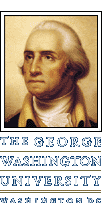 |
|
Published May 16, 2004
It was an enlightening experience because there were innumerable individuals who came to Washington from Harvard, from Yale, from Stanford, and so on who wanted to continue their teaching careers and taught at George Washington University, individuals like Louis Acheson, who was Dean Acheson's brother, who taught American history. Now, just imagine that as an experience. George Gamow, who was a major voice in nuclear physics, taught physics. Elmer Louis Kayser, who was an incredible mentor to me, who taught European history, and his courses were so popular that they had to be held in Lisner Auditorium, and he probably is one of the few professors at George Washington University who ever had a lecture censored by the university, a lecture on Anthony and Cleopatra. Others in the Department of Zoology, where I received my bachelor's degree, were equally impressive, Dr. Hansen as one who was chairman of the department and others. But being in Washington was an incredibly unique experience and very rapidly after I had started school here I was accepted to the medical school. Surprised I was, because it was only after one semester at George Washington University. That wouldn't happen today, as you all very well know. But in the medical school was the incredible opportunity to work with people like John Parks in obstetrics and gynecology, and Brian Blaze in surgery, and Walter Bloedorn, who was an internist and also the dean of the medical school. But it also offered the opportunity to volunteer and work at the National Cancer Institute, and two individuals there were great mentors: Harold Stuart, who was a pathologist; and Thelma Dunn, who was a graduate of this University and has endowed certain areas in the University medical school. So the question is what does The George Washington University mean to me? It gave me at a very critical time in my youth direction. It embedded in me the sense of responsible action. It gave me the sense of morals and ethics. It gave me a lifetime interest in ongoing inquiry, not being satisfied with rote events of one sort or another. It imbued in me the sense to innovate and to participate in research and to be a teacher. I think those were the platforms that made it possible for me to do what I have been able to do, plus all the really very good friends that I have throughout the world who've contributed to my development. So I give you, the graduates, one last word: Don't forget this University. It's an important part of your life. It is something to which you owe a great deal, and we need your ongoing, continuing support. President Trachtenberg, thank you very much.
©2004 The George Washington University Office of
University Relations, Washington, D.C. |
|||


